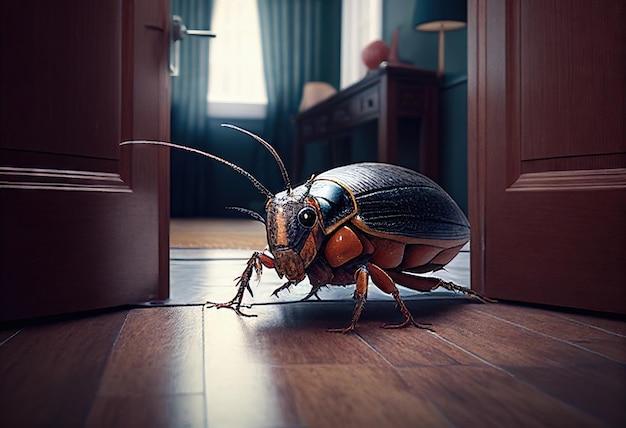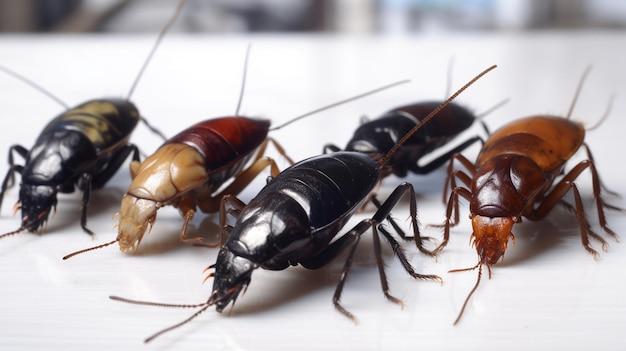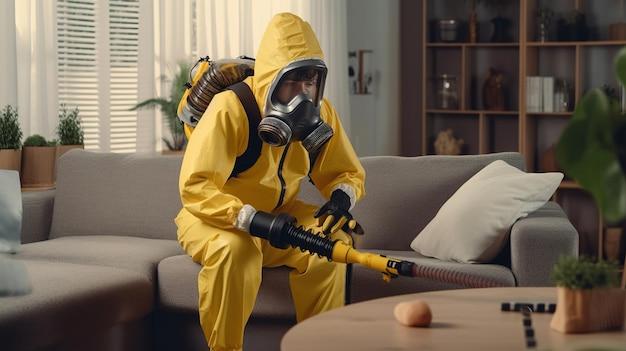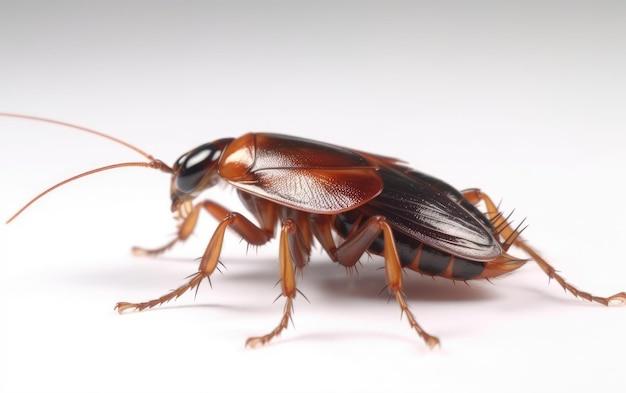Have you been dealing with a roach infestation that just won’t go away no matter what you try? Perhaps you’ve heard about house tenting as a potential solution to your problem. But does tenting a house really kill roaches? In this article, we’ll answer this question and explore other related topics such as the cost of house tenting for roaches, whether fumigation kills cockroach eggs, and how long the effects of fumigation last for roaches. So let’s dive in and find out if tenting is the right solution for your roach problem.
Does Tenting a House Kill Roaches
Ah, roaches – the one insect that strikes fear in the hearts of most homeowners. They are creepy, they are gross, and they can survive almost anything! If you’re dealing with a roach infestation, you might be wondering if tenting your house is the solution. Let’s take a closer look.
The Basics of Tenting
Tenting, also known as fumigation, is a process in which a home is covered with a tent-like structure and a powerful pesticide gas is released inside. This gas is designed to kill any pests that are present in the home, including roaches, termites, and bed bugs.
What Happens to the Roaches
During the tenting process, the pesticide gas will penetrate every inch of your home, including cracks and crevices where roaches like to hide. The gas will suffocate the roaches and kill them off, so you won’t see any survivors.
Will Tenting Get Rid of All Roaches
While tenting can be an effective way to get rid of roaches, it’s not a silver bullet. Roaches are incredibly resilient creatures that can survive for up to a month without food and water. If there are any roaches outside of the house (in the garage, the yard, or the neighbor’s house), they can easily reinfest your home once the tent is removed.
What You Should Know Before Tenting
Before you decide to tent your house for roaches, there are a few things you should know. First, tenting is expensive and can cost several thousand dollars. Second, you will need to vacate your home for several days while the gas does its job. Lastly, you should be aware that tenting is a highly toxic process that can be dangerous to humans and pets. Make sure to follow all safety precautions when tenting your home.
In conclusion, tenting your house for roaches can be an effective way to get rid of these pesky insects, but it’s not a foolproof solution. If you decide to go this route, make sure to consider the cost, the inconvenience, and the potential risks involved. Ultimately, the best way to keep your home roach-free is to practice good sanitation habits and keep your home clean and clutter-free.
House Tenting for Roaches Cost
Let’s be real, dealing with roaches in your home can be annoying and disgusting. You’ve probably tried everything from DIY sprays to professional exterminators, but those critters keep coming back. It’s time to take drastic action, and house tenting might just be the solution you need.
What is House Tenting
House tenting, also known as fumigation, is the process of enclosing a house in a tent and fumigating it with chemicals that kill pests such as roaches, termites, and bed bugs. The chemicals used are highly toxic, and that’s why you need to vacate the house for a few days during the process.
How Much Does It Cost
House tenting for roaches cost varies depending on several factors such as the size of the house, the severity of the infestation, and the location. On average, tenting a two-bedroom house can cost anywhere between $1,200 to $2,500. That’s a lot of moolah, but the good news is that most pest control companies offer payment plans to make it more affordable.
Is it Worth the Cost
Yes, it is. Think about all the money you’ve spent on DIY methods and professional extermination, and yet those pesky roaches keep coming back. House tenting is a one-time cost that can eliminate the infestation completely, saving you money in the long run.
Don’t let roaches take over your home. Contact a pest control company today and discuss your options for house tenting. It may cost a pretty penny, but it’s worth it to have a roach-free home.
Does Termite Tenting Kill Roaches
If you thought roaches were pestering, wait until termites set camp in your humble abode. These tiny critters can eat up your home’s wooden structure, causing immense damage and financial loss. That’s why you need termite tenting, a proven solution in eliminating termites. But can termite tenting kill roaches too? Let’s find out.
What Is Termite Tenting
Termite tenting is a process where a tent or tarpaulin covers your entire home, creating a sealed environment. Chemical gas is then released into your home, eliminating any termites inside. It’s an effective method of getting rid of termites, including subterranean, drywood, and dampwood termites.
Can Termite Tenting Kill Roaches
Unfortunately, no, it doesn’t. Termite tenting only eliminates termites without offering any respite for roaches. The chemicals used in termite tenting mainly target termites and other wood-destroying pests. Cockroaches are a different kind of pest that requires specific treatment.
What Should You Do To Get Rid of Roaches
Roaches can be challenging to get rid of and require a more tailored approach than termite tenting. Here are some tips on how to get rid of pesky roaches:
Hygiene
Roaches thrive in unclean environments, so starting with good hygiene might be helpful. Ensure that your home is always clean, and there are no leftover food particles lying around.
Regular Pest Control
It’s essential to call in pest control experts to fumigate your home and eliminate any roaches inside.
Bait Traps
Bait traps are also an effective way of getting rid of roaches. The roaches are lured into the trap, where they feed on poisoned bait and eventually die.
Chemical Spray
Spraying roaches with an insecticide can also help eliminate them. The spray instantly paralyzes and kills, but ensure that you get a pet-safe and environmentally friendly insecticide.
Termite tenting only eliminates termites, and unfortunately, it doesn’t kill roaches. To get rid of roaches, you need to employ other methods such as good hygiene, pest control, bait traps, and insecticides. So, it’s essential to identify the type of pest infesting your home before seeking the appropriate method.
Does Tenting a House Kill All Bugs
If you’re thinking about tenting your house to get rid of roaches, you might be wondering if it will take care of all the other pesky bugs creeping around your home. After all, why not kill two birds with one stone? Let’s dive into whether or not tenting a house kills all bugs.
The Short Answer
Yes and no. Tenting a house with bug-killing fumigation gas does kill a lot of bugs, but not all of them. Some bugs are resilient and can survive even the strongest poisons. Plus, bug eggs and larvae might be able to survive the fumigation process, so you could still end up with a bug problem down the line.
Bugs That are Killed by Fumigation
The good news is that fumigation is effective at killing many types of bugs. In addition to roaches, it can take care of ants, bed bugs, fleas, ticks, and termites. Since the gas is designed to penetrate deep into the structure of your house, it can reach bugs hiding in cracks, crevices, and walls.
Bugs That are Resilient
Unfortunately, not all bugs are created equal. Some, like spiders, centipedes, and silverfish, have survival tactics that allow them to avoid or tolerate the fumigation gas. Some bugs can hold their breath for a long time, while others can seal themselves in a protective cocoon. If you have a lot of these types of bugs in your home, you might still see some after fumigation.
Tips for Maximizing Bug-Killing
If you really want to make sure that fumigation kills all the bugs in your home, there are some steps you can take. Make sure to clean your house thoroughly before the fumigation process and seal all food and medicine in airtight containers. You might also want to have your home professionally sealed before fumigation to make sure that the gas can’t escape.
While tenting a house is a great way to get rid of roaches and many other types of bugs, it’s not a foolproof solution for all bug problems. Resilient bugs might survive the fumigation, so it’s important to take preventative measures before and after the process to make sure that all bugs are eradicated.
Does Fumigation Kill Cockroach Eggs
So you’ve tented your house and fumigated it with the most potent chemicals money can buy. Now you’re wondering, “Will this kill all the roaches, including their eggs?” Well, my friend, let’s find out.
When it comes to cockroach eggs, these little buggers are tough to crack. But fear not, fumigation is one of the most effective methods to eliminate roaches and their pesky offspring. Here’s how it works.
Fumigation Explained
Fumigation involves sealing the house and introducing a gaseous fumigant that penetrates all nooks and crannies. The fumigant then targets and kills all roaches and their eggs in the house, leaving no survivors.
The Cockroach Life Cycle
To understand how fumigation kills cockroach eggs, let’s first take a brief look at their life cycle. A female roach can lay an egg sac, also known as an ootheca, containing up to 50 eggs. The eggs take about a month to hatch into nymphs, and they grow into adult roaches in about three to four months.
Why Fumigation Works
The fumigant used during the tenting process is a toxic gas that can seep through tiny crevices, killing roaches and their eggs in every nook and cranny. The gas can penetrate cardboard, wood, and fabric, ensuring that there are no hidden nests or eggs left behind.
The Benefits of Fumigation
Fumigation is an effective way to kill roaches and their eggs, as it is a comprehensive treatment that eliminates hidden and hard-to-reach pests. It is also a long-term solution that can keep your home cockroach-free for several months, unlike other treatments that only provide short-term relief.
Does fumigation kill cockroach eggs? Yes, it does. Fumigation targets the entire roach population, including their eggs, and eradicates them completely. So, if you want to get rid of those pesky roaches and their eggs once and for all, fumigation is the most effective method.
Can You Really Tent a House for Cockroaches
Are you tired of seeing cockroaches scurrying in your house every time you switch on the lights? Do you want to get rid of these creepy-crawlies once and for all? If you’ve tried all the DIY methods and still haven’t succeeded, you might be considering professional pest control services. One question that pops up in mind is whether tenting your house is an option. Let’s find out!
What is Tenting for Cockroaches
Tenting (also known as fumigation) is a process of enclosing your home in a large tent and filling it with a gas that kills bugs in all their life stages, including cockroaches. The process usually takes a few days to complete. While it’s a drastic step, it’s often the most effective way to eliminate severe infestations.
Can You Tent a House for Cockroaches
Yes, you certainly can! Tenting is a viable option for getting rid of cockroaches. Professional pest control companies use specialized equipment and chemicals that are effective at eliminating these pesky insects. However, before opting for tenting, it’s essential to consider its pros and cons.
Pros
- Tenting can eradicate cockroaches in all stages of life, from eggs to adults.
- It’s a powerful method of pest control that can eliminate severe infestations.
- It’s a one-time treatment, which means you won’t have to deal with cockroaches again.
- You won’t need to move out of your house during the procedure.
Cons
- The process can be expensive, costing several thousand dollars.
- You’ll need to vacate your home for a few days, which can disrupt your routine.
- You’ll need to remove all living beings from your home, including plants, pets, and people.
- The chemicals used in tenting can be harmful to the environment.
Tenting is an effective way to eliminate cockroaches from your home, but make sure you weigh the pros and cons before considering it. Remember, if you opt for this method, you must hire a licensed professional pest control company to ensure the safety of your family and pets. So, does tenting a house kill roaches? Yes, it does, but make sure you’re aware of all the facts before making a decision!
Are Roaches Still Alive After Fumigation
If you’ve ever battled a roach infestation, you know exactly how pesky these critters can be. And that’s why you might have been considering fumigating your home as a solution.
But the big question on your mind is: Are roaches still alive after fumigation?
Well, let’s start by saying that fumigation involves using pesticides to exterminate pests in an enclosed space, usually a house or building. The process is pretty intense, and it can take a while for the fumes to dissipate.
Here’s what you must understand: Roaches may look indestructible, but they’re still just bugs. And bugs are susceptible to certain chemicals. So, the chemicals used during fumigation are usually powerful enough to kill all roaches that come into contact with them.
However, it’s worth noting that fumigation can only kill roaches that are within the reach of the chemicals used. Roaches that have burrowed into walls or other hidden nooks and crannies might not be affected by the fumigation. Plus, roaches lay eggs, which can hatch later, resulting in a new generation of roaches that haven’t been exposed to the pesticide.
So, to answer the question “Are roaches still alive after fumigation?”, the answer is that it depends on various factors. But if the fumigation company does everything right and uses the right procedures in eradicating the roaches, then it’s highly unlikely for any roaches to survive the process.
In summary, fumigation can be an effective way to rid your home of roaches. The chemicals used during the process are potent enough to kill roaches that are within reach. However, it’s important to remember that not all roaches might be affected by the fumigation, particularly those in hidden spaces. So, the answer to the question “Are roaches still alive after fumigation?” is Yes and No.
How Long Does Fumigation Last for Roaches
Are you tired of seeing creepy crawly cockroaches around your house? Have you tried all sorts of pest control methods to no avail? Well, it’s high time you consider fumigation. It’s a drastic step, but it could be the only option left. But we know what’s on your mind, “How long does fumigation last for roaches?”.
The Duration of Fumigation
Fumigation is an effective pest control method that kills pests by releasing a gas or fumigant into an enclosed space. The duration of the fumigation process varies depending on the size of the space and the level of infestation.
In general, fumigation for roaches can last from 24 hours to 72 hours. The pest control company will determine the length of time based on the size of your house, the type of fumigant used, and the severity of the infestation.
Pre-Fumigation Preparation
Before the fumigation process begins, you need to vacate your house and remove all pets and plants. The company will provide you with a list of things to do beforehand. Make sure you follow their instructions to the letter.
During Fumigation
During the fumigation process, all windows, doors, and vents are sealed to prevent the gas from escaping, and warning signs are posted around the house. The pest control company will monitor the process to ensure that everything goes smoothly.
After Fumigation
Once the fumigation process is complete, the pest control company will aerate your home. This entails opening all the windows and doors to allow fresh air to circulate inside the house. The length of time for the aeration process varies but typically lasts a few hours.
Once the aeration process is complete, the pest control company will give you the all-clear to re-enter your home. You need to clean and wipe every surface in your house after fumigation. Bedding, furniture, clothes, and other upholstery require thorough cleaning, and the company will provide you with instructions on how to do it.
Fumigation is a highly effective pest control method that can help eradicate roaches in your home. In most cases, fumigation can take anywhere from 24 hours to 72 hours. It’s a drastic step, but it could be the only option left. Get in touch with a pest control professional today and kiss goodbye to those pesky cockroaches!
Can you tent a house to get rid of roaches
If you’ve ever experienced a roach infestation or heard horror stories about them, you understand what hell on earth looks like. Roaches are creepy, sneaky, and disgusting insects that thrive in dark and damp places where they can breed uncontrollably.
If you’ve tried everything from using sprays, baits, traps to get rid of them with no success, the question on your mind might be, “Can you tent a house to get rid of roaches?”
The answer, my friend, is a bit complicated. Tenting a house, also known as fumigation, is a pest control method that involves covering your home with a tent and releasing a gas that kills all the pests inside. The tent traps the gas inside, ensuring that it penetrates every surface, leaving no place for the bugs to hide.
However, fumigation is not always effective in eliminating roaches. That’s because despite being efficient for some pests, roaches can survive long periods without food and can quickly adapt to changes in their environment, including the presence of gas.
Moreover, fumigation doesn’t target roaches’ eggs, meaning any eggs left behind will hatch and repopulate your home with more roaches.
What Are the Alternatives
If fumigation doesn’t work, what are your options to get rid of roaches? Here are a few natural remedies you could consider:
Bait Traps
Bait traps use a combination of sweet and fatty foods to attract roaches to feed on poisoned bait, which they then carry back to their nests, killing other roaches. It is an effective way of eliminating roaches and preventing future infestations, and it’s a much safer alternative to pesticides.
Essential Oils
Essential oils such as peppermint, tea tree, and eucalyptus have natural insect repellent properties that repel roaches. Mix a few drops in water and spray around your home’s infested areas.
Boric Acid
Boric acid is a mineral powder that’s lethal to roaches but safe for humans and pets. You can sprinkle it in areas where you’ve seen roaches, and it will kill them within hours.
In conclusion, while tenting a house may work for some pests, it’s often not an effective solution for roaches. Natural remedies such as bait traps, essential oils, and boric acid are safer and easier to use to get rid of roaches and prevent future infestations.



